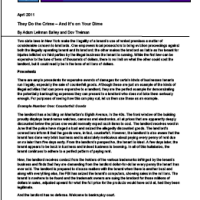By Adam Leitman Bailey and Dov Treiman
Two State laws make a tenant’s illegal use of rented premises a matter of considerable concern to owners. One law empowers local prosecutors to bring eviction proceedings against both the illegally operating tenant and the premises’ owner; the other makes the owner as liable as the tenant for injuries inflicted on third parties by the illegal business the tenant is running. While the first law can be expensive to the tune of tens of thousands of dollars, there is no limit on what the other could cost the owner, but it could readily be in the tens of millions of dollars.
There are ample precedents for expensive damages awards for certain kinds of businesses that tenants run illegally, especially the sale of counterfeit goods. Below are a few examples of the kinds of illegal activities that can prove expensive to an owner, and they are perfect for demonstrating the potentially bankrupting expenses they can present to a owner who does not take them seriously enough.
Example #1: Counterfeit Goods
The owner has a building on Manhattan’s Eighth Avenue in the 40s. The building’s front window proudly displays brand-name watches, brand-name cameras, and brand-name electronics, all at prices that are deeply discounted from prices one would normally expect to pay for such items. The owner receives word that the police have staged a raid and seized the supposedly discounted goods. The owner’s connections inform it that the goods were, in fact, counterfeit. However, the owner is also aware that the tenant is meticulous about paying every penny of rent no later than five days before it’s due. From the owner’s perspective, the tenant is ideal. A few days later, the tenant appears to be back in business and indeed business is booming. In all this hullabaloo, the tenant continues to adhere to a perfect pattern of paying rent.
Now, the owner is contacted by the holders of the various trademarks infringed on by the tenant’s business and finds that they are demanding from the owner every penny of the value of the goods ever sold by the tenant. The owner is prepared to discuss matters with the tenant when there is another raid and the FBI seizes the tenant’s computers, showing sales in the millions. The tenant is nowhere to be found and the trademark owners sue the owner for those millions of dollars in sales, adjusted upward for the full price at which the products would have sold, had they been legitimate.
The owner has no defense. Welcome to the bankruptcy court.
Example #2: Selling Illegal Drugs
The other, vastly more common worry is where a store is being used as a front, or an apartment is being used as a place for the sale of illegal drugs. The branches of the Civil Court throughout the city have specialized units meant to deal with these cases in an expedited manner. The problem for the owner is that such a case can be brought by nearly anyone; an owner or tenant of a neighboring building within 200 feet, a private organization for the suppression of vice, the district attorney, the attorney general or the owner itself. If the owner is not the one prosecuting the case, in addition to whatever losses it may sustain, the court may impose on it the costs of the prosecutor’s legal fees plus an additional penalty of up to $5,000 per incident. While such penalties are not routinely inflicted for first-time violators, any owner who is regularly caught in such a proceeding can expect the penalties to mount up quickly and severely. In fact, one of the reasons the City has special segregated court parts to hear these cases is so that the court staff and parties will gather a sense of who the regular players are and respond accordingly. This does, in fact, expedite the proceedings enormously. It also means that no sane owner would want to be found twice in any such part. In this regard, it should be noted that owners may try to slide around this by changing corporate ownership. It doesn’t work. The court personnel find out quickly enough who the players are and learn to recognize faces. Owners can also face the identical problems when their premises are used as houses of prostitution.
Example #3: The White Collar Criminal
Finally, owners need to look out for the less obvious criminal – the white collar criminal. For those who, for example, are running Ponzi schemes out of their storefronts or apartments, the owner may have far fewer clauses that its premises are being used as a place of an illegal enterprise. There may be no particularly significant traffic. There may be no collections of strangers. There may be no disreputable-looking people no dirty clothing, no blood shot eyes, no sniffling, no jittery behavior. But the store or apartment may nonetheless be the site of a large-scale illegal operation, such as, most commonly, stock fraud. In the days before the invention of cell phones and internet telephones, such place were readily distinguishable by the large numbers of heavy trunk-line telephone wires coming in. Those days are gone. But there are cases out there holding the owner liable for such operations.
While clearly easier said than done, the fact remains that there is simply no substitute for vigilance. The only thing worse than an owner who does not keep its eyes open for hanky-panky in its building is one whose eyes are slammed shut to such goings on. If a tenant pays well, this is good, but if the tenant pays too well, especially in cash, the owner will want to be on the alert. The price of such prosperity can be total bankruptcy.


 Twitter
Twitter